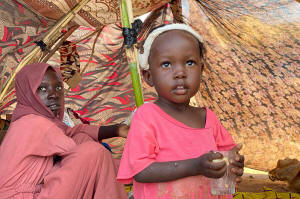Fate of thousands feared in Darfur after reported rampage by Sudanese
paramilitary force
[October 31, 2025]
By SARAH EL DEEB and FARNOUSH AMIRI
CAIRO (AP) — Sudanese fleeing a paramilitary force that seized a city in
the country’s Darfur region trickled into a nearby refugee camp Thursday
after walking for miles, telling aid workers that roads were littered
with bodies. Aid groups feared for the fate of thousands more trying to
escape, with hundreds reportedly killed in the turmoil.
The U.N. Security Council convened an emergency meeting on Sudan amid
international alarm over the bloodshed. U.N. officials have warned of a
rampage by the paramilitary Rapid Support Forces after it took over the
city of el-Fasher, reportedly killing more than 450 people in a hospital
and carrying out ethnically targeted killings of civilians and sexual
assaults.
Speaking at the meeting, U.N. humanitarian chief Tom Fletcher criticized
the Security Council for not acting sooner in Sudan. The country has
been torn for the past two years by a war between the military and the
RSF that has killed more than 40,000 people and left more than 14
million displaced.
“Can anyone here say we did not know this was coming?” he said. “We
cannot hear the screams, but as we sit here today the horror is
continuing. Women and girls are being raped, people being mutilated and
killed with utter impunity.”
As the U.S. and others at the gathering called for an end to “external
support” for the warring parties, Sudan’s representative accused the
United Arab Emirates, a top American ally, of backing the RSF. The Gulf
nation has denied reports it provides weapons and funding to the
paramilitary forces. A U.N. panel of experts in 2024 said it found the
reports credible.
The RSF had been besieging el-Fasher, the last military-held stronghold
in the Darfur region, for the past 500 days. Its capture raises fears
that Africa’s third-largest nation may split, with the paramilitaries
holding Darfur and the military holding the capital Khartoum and the
north and east of the country.

A terrifying escape
The U.N. migration agency said over 36,000 have reportedly fled el-Fasher
since Sunday, with people fleeing on foot in the middle of the night.
Experts analyzing satellite imagery say an earthen wall built by the RSF
around the city is preventing residents from fleeing and has become a
“kill box” where some appear to have been shot.
Only thousands have arrived at Tawila, a town some 60 kilometers (35
miles) west of el-Fasher. Tawila has already burgeoned into a sprawling
refugee camp housing hundreds of thousands who fled the RSF’s siege of
el-Fasher over the past year.
Mathilde Vu, advocacy manager for the Norwegian Refugee Council, which
manages the camp, said the small number reaching Tawila “should be a
concern for all of us ... That tells the horror of the journey.”
The new arrivals told aid workers that there were arbitrary killings by
RSF along the roads, which were littered with bodies, the International
Rescue Committee said. Save the Children said arriving women described
hiding with their children in trenches or abandoned buildings inside el-Fasher
to escape fighters, then being attacked and robbed by armed men as they
left the city.
Vu said the vast majority of those arriving in Tawila are women, or
families headed by women, as well as large numbers of children separated
from their parents. Some among the arrivals were injured, many were
malnourished.
Some women reported rapes as they fled, Vu said.
“Men are just not arriving. Either they were killed, disappeared or lost
along the way,” she said.
In Tawila, the newly displaced sheltered under trees. One woman, Aisha
Ismael, said she arrived barefoot with none of her belongings amid
constant drone attacks and shelling. People foraged for livestock fodder
known as ambaz, which is made from peanut shells and water, because they
were so hungry.
“We looked for it in the dirt to eat and they didn’t even let us. If
they catch us, they hit us and throw it away,” she said.
Reports of killings in el-Fasher
Disrupted communications around el-Fasher has made assessing the
devastation inside the city difficult. Witnesses told The Associated
Press that RSF fighters went from house to house, beating and shooting
people, including women and children.

[to top of second column]
|

Nabaa Ahmed, 3, an injured Sudanese who fled el-Fasher city, after
Sudan's paramilitary forces killed hundreds of people in the western
Darfur region, receives medical care at a camp in Tawila, Sudan,
Thursday, Oct. 30, 2025. (AP Photo/Mohammed Abaker)

Some 460 patients and their companions were reportedly killed
Tuesday at the Saudi Hospital in el-Fasher, said Tedros Adhanom
Ghebreyesus, the director-general of the World Health Organization.
The AP has not been able to independently confirm the hospital
attack and death toll.
The RSF on Thursday denied carrying out killings at the hospital. It
said it had arrested a number of individuals accused of committing
violations during the seizure of el-Fasher.
The Yale School of Public Health’s Humanitarian Research Lab said
satellite imagery from Airbus corroborated alleged killings by the
RSF around the Saudi Hospital. It also analyzed images of a
children’s hospital that the RSF turned into a detention center
months ago and found “a pile consistent with human remains” in the
yard.
“We think those are people who were killed at the detention center,”
the lab's executive director Nathaniel Raymond said.
The Yale researchers also said that “systematic killings” took place
in the vicinity of the earthen wall, which the RSF built outside the
city earlier this year.
“The entire city is surrounded by a berm. It is a kill box, to trap
them, to kill them,” said Raymond.
External support
At the Security Council gathering, U.S. ambassador to the U.N.
Dorothy Shea condemned “the horrific violence occurring in el-Fasher.”
She repeated Washington's stance that the RSF and its allied
militias have committed genocide in Sudan.
She said American officials are working to secure “an immediate
humanitarian truce and halting external support” for the violence in
Sudan.
The military — which opponents say is linked to Sudanese Islamist
groups — and the RSF were previously allies in ruling Sudan, until
they fell out in a struggle for power in 2003. Both sides have faced
allegations of human rights abuses.
But rights groups and the United Nations have accused the RSF and
allied Arab militias of repeated mass killings of civilians and
widespread rapes, mainly targeting non-Arab communities. The RSF is
largely made up of fighters from the Janjaweed militia that
committed genocide in the early 2000s in Darfur.
Egypt, where the military dominates the government, gives political
backing to the Sudanese military, seeing it as a more reliable ally
in the neighboring nation.

The UAE is reported to back the RSF, similar to its support of armed
factions in Libya and Yemen to spread its influence and combat
Islamist groups. It has repeatedly denied allegations that it
funnels weapons to the RSF. But in January 2024, the U.N.-appointed
Panel of Experts for Sudan detailed reports of cargo planes believed
to carry weapons destined for the RSF through neighboring Chad and
called the reports credible.
During Thursday’s session, the UAE’s representative to the U.N.,
Mohamed Abushahab, said the Gulf state stands in “solidarity” with
the Sudanese people and announced $100 million in humanitarian aid.
Sudan’s U.N. Ambassador Al-Harith Idriss Al-Harith Mohamed accused
the UAE of waging a “war of aggression” in Sudan with its support of
the RSF and criticized the Security Council for failing to take “any
practical measures to hold this particular sponsor and others
accountable.”
___
Amiri reported from the United Nations. AP correspondents Jamey
Keaten in Geneva, Toqa Ezzidine in Cairo, and Jon Gambrell in Dubai,
United Arab Emirates, contributed to this report.
All contents © copyright 2025 Associated Press. All rights reserved |